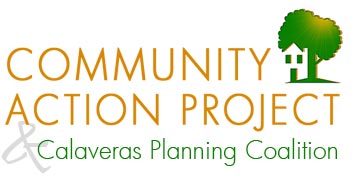project focused on sustainable land use planning.
Find out more about us >>
Tulloch rental rules approved
County moves ahead with permit fees
Efforts to contain the clamor surrounding Lake Tulloch vacation rentals won a nod from Calaveras County planning commissioners last week, part of a 4-1 vote that sends additional proposed rental regulations on to the Board of Supervisors.
Planners are looking to charge a $2,033 fee for each rental permit, which would allow for no more than two occupants per room and four parking spaces per dwelling and would be good for one year.
Staffers remain unsure what county supervisors would like to charge for annual permit renewals, although county Planner Darcy Goulart doubts the county will ask for anything close to the initial permit fee.
“The process will be reduced in terms of a fee,” Goulart said. “That’s something we’ll be exploring with the (Board of Supervisors) but $2,033 probably isn’t warranted when you’re looking at a renewal.”
Commissioner Mike Miller cast the sole dissenting vote on Thursday’s proposal, one which hopes to tighten existing occupancy and length-of-stay regulations through a new permit aimed at the handful of Tulloch homeowners who lease docks and lakeside homes to summer vacationers.
Miller’s district, which includes Lake Tulloch, has seen an uptick in rental noise and disturbance-related complaints in recent years, a pattern he chalked up to the lake’s history.
“I’m familiar with Lake Tulloch going back to the early 70s: It was a vacation destination and it was a party place,” Miller explained. “The perimeter of the lake that is now recreational property is still recreational and to put residential property next to it is like moving into an airport and complaining about the noise.”
He fears the move will have a chilling effect on Tulloch tourism should it win over supervisors.
“I’ve spoken with the business owners and I think that the businesses down there make a lot of money from the renters when they come in,” Miller added. “Any ordinance that would deal with Lake Tulloch only is one I don’t agree with, it should be countywide.”
Copperopolis business owner Robin Groves also spoke up against the effort, one she, like Miller, opposed in light of potential commercial impacts.
“One of my businesses doesn’t have many transient visitors – many second-home people who come in – but one of my businesses does,” Groves said. “I can show you the numbers when, during September, the numbers go down as people go back to the bay.”
“I think there needs to be a structure, but I’m just not sure this is the way to do it,” she continued.
Jack Cox, former president of Copper Cove at Lake Tulloch Owners Association, looked to dispute that claim with findings from an economic impact study commissioned by his own Lake Tulloch Alliance, a “citizen’s advocacy group.”
“Rental advocates say summer rentals have a huge impact on the economy, but we demonstrated in a report last year that just isn’t the case,” Cox told commissioners last week. “One fulltime resident will be there 52 weeks out of the year; they’ll contribute four or five times what one rental house will to the economy.”
The permit, he added, should count as just a start toward clamping down on rental occupants.
“The unregulated and illegal summer rental business has become a big problem,” Cox said. “I bought my house with my eyes wide open, but I didn’t buy it so that someone could open up a business next door.”
Longtime Tulloch homeowner and Conner Estates Homeowners Association President Graham Anderson agreed. He said short-term rental occupants have long abused existing zoning codes and municipal restrictions while county officials have looked the other way.
“We’re very supportive of the ordinance,” Anderson said. “I think the issue has been raised of how to cover associations where (rentals) have already been banned: My association is one of those and I can imagine a situation whereby one of my homeowners slips through the net and gets a permit under this new ordinance, to have a short-term rental, and when I tell them they can’t because (association covenants, conventions and restrictions) don’t allow it, I can imagine the lawsuit that would follow.”
A pair of commissioners shared Anderson’s concerns over potential conflict between HOA rules and county ordinances, including Dawn McLaughlin, who joined District 1 Commissioner Ted Allured in pressing planning staff to “make sure that a permit is not seen as some way around a (homeowners association) ban.”
Both Commissioners Greg Gustafson and Michelle Plotnik cast their support for the ordinance in similar terms, but not without some hesitation.
“There are municipal codes in place for a lot of these things,” Gustafson said. “There are a lot of general questions I don’t know how to answer. But the parking seems to be a real problem and it seems like people that have a higher-end rental tend to pack the units.”
“We do need to acknowledge that we’re not enforcing HOA code here and that it’s up to the HOA’s if they feel a ban is appropriate,” Plotnik agreed. “It seems like it would be a good overall warning to people because we don’t know what HOA’s will do in the future as far as allowing or not allowing these rentals.”
“It’s just think it’s a really valiant effort on a difficult topic,” she concluded
Contact James DeHaven at here.

